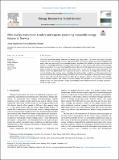Elite energy transitions : leaders and experts promoting renewable energy futures in Norway
Abstract
This article shows how energy transitions are advanced by energy elites – the leaders and experts of energy companies. While the dominant literature suggests that elites resist societal changes, this research highlights that energy elites are instrumental in the promotion of energy transitions. The findings in this article are based on 18 months of ethnographic fieldwork in energy companies based in Oslo, Norway, and analysed using anthropological perspectives. The research has found that energy elites, faced with climate change concerns, re-imagined energy futures and accordingly reoriented their careers. Out of a total of 109 energy elites interviewed, 30% decided to leave the hydrocarbon sector in pursuit of careers in renewables. As energy elites left their occupations in oil and gas, they inspired others – including elites and non-elites – to follow suit. This suggests that elites are not only crucial to the pursuit of energy transitions but can also be key pillars of promoting societal changes. What is more, the research demonstrates that elites do not operate in isolation. Factors like social networks, politico-economic contexts, and changes in investor climates all contribute to the promotion of low-carbon energy futures. This article provides a deeper understanding of the multifaceted drivers of energy transitions – in Norway and beyond.
Citation
Rauter , A R K K 2022 , ' Elite energy transitions : leaders and experts promoting renewable energy futures in Norway ' , Energy Research and Social Science , vol. 88 , 102509 . https://doi.org/10.1016/j.erss.2022.102509
Publication
Energy Research and Social Science
Status
Peer reviewed
ISSN
2214-6296Type
Journal article
Description
This project has received funding from the European Research Council (ERC) under the European Union's Horizon 2020 research and innovation programme under grant agreement No. 715146.Collections
Items in the St Andrews Research Repository are protected by copyright, with all rights reserved, unless otherwise indicated.
Related items
Showing items related by title, author, creator and subject.
-
Roadmap on energy harvesting materials
Pecunia, Vincenzo; Silva, S Ravi P; Phillips, Jamie D; Artegiani, Elisa; Romeo, Alessandro; Shim, Hongjae; Park, Jongsung; Kim, Jin Hyeok; Yun, Jae Sung; Welch, Gregory C; Larson, Bryon W; Creran, Myles; Laventure, Audrey; Sasitharan, Kezia; Flores-Diaz, Natalie; Freitag, Marina; Xu, Jie; Brown, Thomas M; Li, Benxuan; Wang, Yiwen; Li, Zhe; Hou, Bo; Hamadani, Behrang H; Defay, Emmanuel; Kovacova, Veronika; Glinsek, Sebastjan; Kar-Narayan, Sohini; Bai, Yang; Kim, Da Bin; Cho, Yong Soo; Žukauskaitė, Agnė; Barth, Stephan; Fan, Feng Ru; Wu, Wenzhuo; Costa, Pedro; del Campo, Javier; Lanceros-Mendez, Senentxu; Khanbareh, Hamideh; Wang, Zhong Lin; Pu, Xiong; Pan, Caofeng; Zhang, Renyun; Xu, Jing; Zhao, Xun; Zhou, Yihao; Chen, Guorui; Tat, Trinny; Ock, Il Woo; Chen, Jun; Graham, Sontyana Adonijah; Yu, Jae Su; Huang, Ling-Zhi; Li, Dan-Dan; Ma, Ming-Guo; Luo, Jikui; Jiang, Feng; Lee, Pooi See; Dudem, Bhaskar; Vivekananthan, Venkateswaran; Kanatzidis, Mercouri G; Xie, Hongyao; Shi, Xiao-Lei; Chen, Zhi-Gang; Riss, Alexander; Parzer, Michael; Garmroudi, Fabian; Bauer, Ernst; Zavanelli, Duncan; Brod, Madison K; Malki, Muath Al; Snyder, G Jeffrey; Kovnir, Kirill; Kauzlarich, Susan M; Uher, Ctirad; Lan, Jinle; Lin, Yuan-Hua; Fonseca, Luis; Morata, Alex; Martin-Gonzalez, Marisol; Pennelli, Giovanni; Berthebaud, David; Mori, Takao; Quinn, Robert J; Bos, Jan-Willem G; Candolfi, Christophe; Gougeon, Patrick; Gall, Philippe; Lenoir, Bertrand; Venkateshvaran, Deepak; Kaestner, Bernd; Zhao, Yunshan; Zhang, Gang; Nonoguchi, Yoshiyuki; Schroeder, Bob C; Bilotti, Emiliano; Menon, Akanksha K; Urban, Jeffrey J; Fenwick, Oliver; Asker, Ceyla; Talin, A Alec; Anthopoulos, Thomas D; Losi, Tommaso; Viola, Fabrizio; Caironi, Mario; Georgiadou, Dimitra G; Ding, Li; Peng, Lian-Mao; Wang, Zhenxing; Wei, Muh-Dey; Negra, Renato; Lemme, Max C; Wagih, Mahmoud; Beeby, Steve; Ibn-Mohammed, Taofeeq; Mustapha, K B; Joshi, A P (2023-08-07) - Journal articleAmbient energy harvesting has great potential to contribute to sustainable development and address growing environmental challenges. Converting waste energy from energy-intensive processes and systems (e.g. combustion ... -
Towards energy care ethics : exploring ethical implications of relationality within energy systems in transition
Damgaard, Caroline Sejer; McCauley, Darren; Reid, Louise (2022-02) - Journal articleSocial science energy research is asking important questions about the social, political, and economic implications of energy transitions, and the consequent changing roles and relationships in the energy system. This has ... -
The power of friends and neighbors : a review of community energy research
van der Schoor, Tineke; Scholtens, Bert (2019-09-28) - Journal itemThe threat of climate change and the Paris agreement to limit global temperature rise to well below 2°C and to pursue efforts to limit it to 1.5°C has stimulated research on and broad commitment to community energy. We ...

